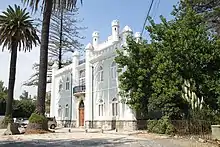Universidade de Lisboa | |
 | |
| Latin: Universitas Olisiponensis | |
| Motto | Ad Lucem (Latin) |
|---|---|
Motto in English | To the light |
| Type | Public research university |
| Established |
|
| Rector | António da Cruz Serra |
Academic staff | 3,369 (2018) |
Administrative staff | 2,106 (2018) |
| Students | 47,794 (2018–19) |
| Undergraduates | 35,063 (2018–19) |
| Postgraduates | 12,731 (2018–19) |
| Location | , |
| Campus | several locations, Lisbon metropolitan area |
| Colours | Black and white (University; rectory) |
| Affiliations | |
| Website | ulisboa.pt |
The University of Lisbon (ULisboa; Portuguese: Universidade de Lisboa) is a public research university in Lisbon, and the largest university in Portugal. It was originally founded in 1911, but the present structure of the university dates from the 2013 merger of the former University of Lisbon (1911–2013) and the Technical University of Lisbon (1930–2013).
History

University of Coimbra, the first Portuguese university, was established in Lisbon between 1288 and 1290, when Dinis I promulgated the letter Scientiae thesaurus mirabili, granting several privileges to the students of the studium generale in Lisbon, proving that it was already founded on that date. There was an active participation in this educational activity by the Portuguese Crown and its king, through its commitment of part of the subsidy of the same, as by the fixed incomes of the Church. This institution moved several times between Lisbon and Coimbra, where it settled permanently in 1537.
The current University of Lisbon is the result of the merger of two former public universities of Lisbon, the former University of Lisbon, founded in 1911 and the Technical University of Lisbon, founded in 1930. The merger process was initiated in 2011 and was made into law on 31 December 2012. As stated on the decree-law No. 266-E/2012, the new University of Lisbon began its legal existence on the day the newly elected rector took office, on 25 July 2013.
Predecessors
Organization
As of 2013, the University of Lisbon comprises eighteen schools and its research institutes:
- Faculdade de Arquitetura (FA) - School of Architecture
- Faculdade de Belas-Artes (FBA) - School of Fine Arts
- Faculdade de Ciências (FC) - School of Sciences
- Faculdade de Direito (FD) - School of Law
- Faculdade de Farmácia (FF) - School of Pharmacy
- Faculdade de Letras (FL) - School of Letters
- Faculdade de Medicina (FM) - School of Medicine
- Faculdade de Medicina Dentária (FMD) - School of Dental Medicine
- Faculdade de Medicina Veterinária (FMV) - School of Veterinary Medicine
- Faculdade de Motricidade Humana (FMH) - School of Human Motricity
- Faculdade de Psicologia (FP) - School of Psychology
- Instituto de Ciências Sociais (ICS) - Institute of Social Sciences
- Instituto de Educação (IE) - Institute of Education
- Instituto de Geografia e Ordenamento do Território (IGOT) - Institute of Geography and Territorial Planning
- Instituto Superior de Agronomia (ISA) - School of Agronomy
- Instituto Superior de Ciências Sociais e Políticas (ISCSP) - School of Social and Political Sciences
- Instituto Superior de Economia e Gestão (ISEG) - School of Economy and Management
- Instituto Superior Técnico (IST) - School of Engineering
It also comprises six specialized units, social and shared services, and the Lisbon University Stadium.



Rankings
| University rankings | |
|---|---|
| Global – Overall | |
| ARWU World[1] | 151–200 (2020) |
| CWTS World[2] | 124 (2019) |
| QS World[3] | 338 |
| THE World[4] | 501–600 (2020) |
| USNWR Global[5] | 214 (2020) |
According to the Academic Ranking of World Universities 2017, also known as Shanghai Ranking, the University of Lisbon is ranked first in Portugal and 151–200 (overall) in the world. In the broad subject field of Engineering/Technology and Computer Sciences the university is ranked 51–75 worldwide, while in the disciplines of Mathematics, Physics and Computer Science it is ranked 101–150, 151–200 and 151–200, respectively.[6]
In the Times Higher Education World University Rankings (THE) 2017 the University of Lisbon is regarded as the largest university in Portugal and is ranked 401–500 (overall),[7] while in the QS World University Rankings 2018 it is ranked 305 (overall).[8]
Notable people
Humanities
Literature
Law
Fine Arts
Sciences
Business
Politics
Heads of state and government
Leaders of international organizations
See also
References
- ↑ "Academic Ranking of World Universities 2019 - University of Lisbon". ShanghaiRanking. Retrieved 15 December 2019.
- ↑ "CWTS Leiden Ranking 2019". Retrieved 15 December 2019.
- ↑ "QS World University Rankings 2020 - University of Lisbon". QS Top Universities. Retrieved 15 December 2019.
- ↑ "World University Rankings 2019 - University of Lisbon". Times Higher Education (THE). Retrieved 17 August 2019.
- ↑ "Best Global Universities 2020 - University of Lisbon". U.S. News Education. Retrieved 15 December 2019.
- ↑ "Academic Ranking of World Universities (Shanghai Ranking) 2016 - University of Lisbon". shanghairanking.com. Retrieved 26 June 2017.
- ↑ "Times Higher Education World University Rankings 2017 - University of Lisbon". timeshighereducation.com. Retrieved 26 June 2017.
- ↑ "QS World University Rankings® 2018 - University of Lisbon". topuniversities.com. Retrieved 26 June 2017.
External links
- Official website (in Portuguese)
- Official website (in English)